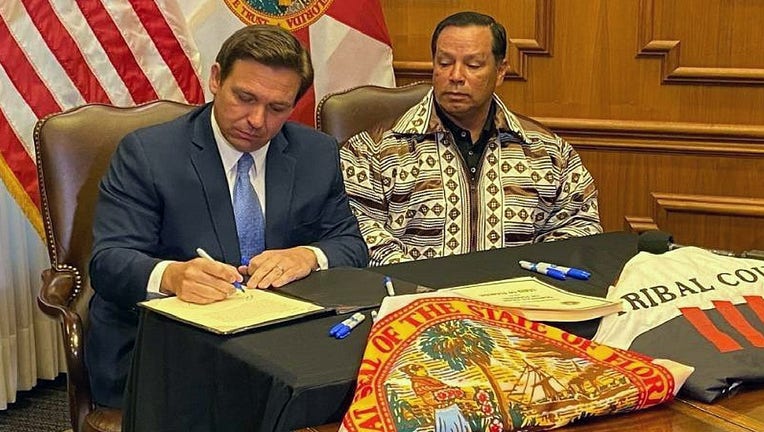Fate of gambling deal unclear as Seminole Tribe makes case

Gov. Ron DeSantis signs the gambling compact with Seminole Tribe of Florida Chairman Marcellus Osceola Jr. earlier this year.
TALLAHASSEE, Fla. - The legality of sports betting in Florida remained uncertain Wednesday, as the Seminole Tribe escalated efforts to keep intact a deal giving it control over online sports wagering following a judge’s ruling that the agreement violates federal law.
The tribe’s latest legal salvos gave no indication of plans to comply with U.S. District Judge Dabney Friedrich’s Nov. 22 order vacating a deal signed this spring by Gov. Ron DeSantis and tribal Chairman Marcellus Osceola, Jr. and approved by the Legislature in a May special session. The U.S. Department of the Interior, which oversees Indian gambling, allowed the plan to move forward in August.
Friedrich’s ruling focused on part of the agreement, known as a gambling compact, that opened the door for the first time to sports betting in Florida. Under the deal, bettors anywhere in the state can place online wagers on sports events, with bets handled by computer servers on tribal lands.
Owners of Magic City Casino in Miami-Dade County and Bonita Springs Poker Room in Southwest Florida filed a lawsuit challenging the Department of the Interior’s tacit approval of the compact, arguing that the sports-betting plan is a "legal fiction" because federal law does not authorize bets that occur off tribal lands.
In last week’s ruling, Friedrich found the compact violated a federal law known as the Indian Gaming Regulatory Act, or IGRA. She scrapped the entire deal and rejected the Seminoles’ request to intervene in the lawsuit, which was filed against the Department of the Interior, and have it dismissed based on the tribe’s sovereign immunity.
After the ruling, the tribe has continued to allow people in Florida to place wagers on a sports-betting mobile app, which rolled out Nov. 1. The Seminoles on Nov. 25 filed an emergency motion requesting the U.S. Circuit Court of Appeals for the District of Columbia to stay Friedrich’s decision and has asked a three-judge panel of the court to rule on the motion by Friday.
The tribe has maintained that it should have been allowed to intervene in the lawsuit. In a court document filed Wednesday, the Seminoles’ lawyers said Friedrich’s ruling has had "an immediate chilling effect, with key vendors discontinuing their business with the tribe even as it seeks a stay."
Under the 30-year compact, the Seminoles agreed to pay the state at least $2.5 billion over the first five years in exchange for controlling sports betting and being allowed to add craps and roulette to the tribe’s casino operations. The Seminoles’ motion for a stay said the tribe paid $37.5 million to the state in October and another $37.5 million in November.
"Without a stay, the tribe will suffer injury to its sovereignty, and hundreds of tribal and vendor jobs related to sports betting, craps, and roulette will be lost, hurting hundreds of Floridians and their families," Wednesday’s 15-page brief said.
The Department of the Interior told the appeals court Tuesday that it did not oppose the Seminole’s emergency motion but disagreed with the tribe’s analysis. The federal agency said it has not decided whether to separately appeal Friedrich’s ruling.
But on Wednesday, the tribe ripped into the Biden administration’s defense of the compact, telling the court "whether the federal defendants adequately represent the tribe’s interests in this case is a serious legal question that warrants more deliberative investigation."
During a two-hour hearing on Nov. 5, Friedrich spent the first 30 minutes wrangling with Rebecca Ross, a lawyer with the Justice Department’s Indian Resources Section, about the government’s unwillingness to take a position on the issue at the crux of the plaintiffs’ lawsuit: whether the sports-betting provision is in keeping with IGRA.

